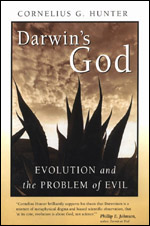 Review by Robert M. Bowman, Jr.
Review by Robert M. Bowman, Jr.
According to the conventional wisdom, creation is religion while evolution is science. In Darwin’s God: Evolution and the Problem of Evil, Cornelius G. Hunter delivers a fresh critique of this common assumption. Hunter shows that religious concerns lay at the root of Darwin’s case for evolution and that they drive the scientific arguments for evolution even to this day.
Hunter challenges many conventional thoughts about evolution on both sides of the debate. Creationists often argue that evolution presupposes the nonexistence of God, while evolutionists commonly claim to be convinced of evolution independent of any religious presuppositions. According to Hunter, neither claim is true: “Evolution is neither atheism in disguise nor merely science at work.” Rather, the theory of evolution formulated by Charles Darwin in his 1859 book Origin of Species presupposed a specific concept of God that was common in Victorian society.
As the book’s subtitle indicates, Darwin’s theory of evolution was actually devised as a solution to the problem of evil. The crux of his argument was that life in the real world is not the pretty or pleasant existence a good God would make it. Darwin could not persuade himself that God intended “that the cat should play with mice.” Modern thinkers from Milton to Leibniz resolved the problem of moral evil—the bad things that humans do—by distancing God from human events: God made human beings autonomous and cannot be blamed for their imperfections. Darwin resolved the problem of natural evil—the “bad” things that occur in nature—by distancing God from natural events: God made nature autonomous and cannot be blamed for its imperfections. In this way, Darwin defended God’s goodness at the cost of denying God’s sovereignty.
Darwin’s seemingly neutral argument then turns out to depend on metaphysical, religious presuppositions. Hunter shows that the main evidences for evolution depend on the assumption that if God had created living things directly, he would not have made them the way they are. In three chapters, Hunter summarizes the purported evidence for evolution from comparative anatomy, observable small-scale changes in living things, and the fossil record. Along the way he points out various problems with the evidence and exposes the metaphysical arguments underlying the scientific considerations. For example, he quotes evolutionist Stephen Jay Gould as saying, “Odd arrangements and funny solutions are the proof of evolution—paths that a sensible God would never tread but that a natural process, constrained by history, follows perforce.” In this same vein, Darwin once joked that he found it hard to believe that “the shape of my nose was designed.” In a later chapter, Hunter explains that “nature’s failure to fulfill our ideals and expectations was considered clear proof of evolution. All birds should fly, but since some don’t, there must be a crude law of nature rather than a Creator behind such incompetence.”
To a great extent, then, Darwin’s theory of evolution was prompted by the inadequacies of creationism as understood in the eighteenth and nineteenth centuries. Having proved that species are not the immutable, optimally designed creatures that creationists purported them to be, Darwin concluded that creationism was false. Hunter writes: “Evolution is supported by the premise that God must make species absolutely fixed—beaks must not get longer and coloration must not change. And since beaks do get longer and coloration does change, we know that God must not have created them.” In Darwin’s day, creationists assumed that God would never allow any species to become extinct. The revelations of extinct species in the fossil record seemed, therefore, to disprove creation.
Darwin’s God, while provocative and insightful, is lacking in one respect. Again and again Hunter makes the crucial point that Darwin’s theory of evolution was an attempt to explain how God could have created a world with suffering and death. Darwin’s explanation is ultimately at odds with the biblical view of God as Creator and providential Caretaker of his world.
Unfortunately, Hunter does not clearly offer an alternative. Granted that Darwin’s solution to the problem of natural evil is biblically unacceptable, Christians need to offer a fully developed, positive alternative that is both biblically sound and scientifically credible.
Nonetheless, what Hunter reveals in Darwin’s God is extremely valuable. By exposing the religious roots of evolution, Hunter sheds new light on the debate about the relationship between science and religion.